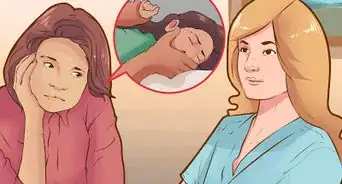This article was co-authored by Tracy Carver, PhD. Dr. Tracy Carver is an award-winning Licensed Psychologist based in Austin, Texas. Dr. Carver specializes in counseling for issues related to self-esteem, anxiety, depression, and psychedelic integration. She holds a BS in Psychology from Virginia Commonwealth University, an MA in Educational Psychology, and a Ph.D. in Counseling Psychology from The University of Texas at Austin. Dr. Carver also completed an internship in Clinical Psychology through Harvard University Medical School. She was voted one of the Best Mental Health Professionals in Austin for four years in a row by Austin Fit Magazine. Dr. Carver has been featured in Austin Monthly, Austin Woman Magazine, Life in Travis Heights, and KVUE (the Austin affiliate for ABC News).
There are 13 references cited in this article, which can be found at the bottom of the page.
This article has been viewed 117,269 times.
Most people enjoy being alone sometimes, but others dread even short periods of time spent in solitude. Autophobia often surfaces when a person feels ignored, unloved, and unsatisfied.[1] If being alone prompts a sense of dread and extreme isolation, you might have autophobia. Luckily, you can learn to overcome this issue with dedication, perseverance, and the right amount of support.
Steps
Assessing Your Condition
-
1Evaluate the severity of fear. Having a good handle on your symptoms will guide you toward the best methods of treatment, and indicate how much self-work you can do on this phobia without the risk of physical harm. Check for fit with the following specifications, which are present for six months or longer:[2]
- Strong, out of proportion fear to being alone or the anticipation of being alone
- Immediate anxiety response upon being or anticipating being alone, which may take the form of a panic attack
- Personal recognition that the fear is disproportionate to the dangers of being alone
- Avoidance of being alone or solitude is endured with intense anxiety or distress
- Avoidance, anxious anticipation or distress of being alone interferes significantly with your normal routine, work (or academic) functioning, or socializing and relationships
- Distress about autophobia itself
-
2Listen to your doubts. Is there some negative judgment about being alone that haunts you? For instance, you might fear being seen as a loner, or as anti-social and strange. Some worry about being viewed as selfish and unthoughtful for taking time out for themselves.[3]
- Thinking about the messages you give yourself while you are alone is a worthwhile project. Doing so will allow you to see over and above the more superficial reasons why you think you do not like to be alone.
Advertisement -
3Journal about the fear. Ask yourself whether or not you feel capable of creating your own happiness and to take care of yourself. Then, push yourself to think about what it is that others do for you that you are unable to do alone. Consider what about being alone creates fear for you. Answering questions like these in your journal can provide insight and clarity into your fear:
- How long has this fear been with you?
- What was going on when it started?
- How has it changed since then?
-
4Consider your role in close relationships. People who fear being alone typically perceive their relationships as requiring lots of upkeep. Do you feel you must take care of or devote a large amount of time and energy to the other person?
- Try to be realistic about what others need from you by reflecting on their capability to provide for and take care of themselves. You can also think about others who are around to support them, or perhaps the fact that they were doing fine before you met.
- This tendency to give others the depth of love and attention that you want for yourself is problematic. This might be one way that you are robbed of the solitude needed to develop your own values and unique personality. In fact, this tendency ironically stops you from being able to direct focus outward onto others in a meaningful way.[4]
Facing the Fear
-
1Prepare to face your fear. Try convincing yourself of the value of overcoming this fear. Make a list of advantages and disadvantages to spending time alone. Remember to consider the cost of this fear on your relationships, your own passions, and your self-development.
-
2Define specific goals. For instance, you may decide that you will spend fifteen minutes alone without calling, texting, or messaging anyone, and as long as you need to process those fifteen minutes. This process might take place four times a week.
- Think about why you want to conquer your fear of being alone—like you're thinking of breaking up with your partner. This can help you determine what your goals should be.[5]
- Make exposure gradual and take into consideration how bad your fear is. This process takes time and should not be rushed. Plan to be alone for short spurts. Little by little, you will want to plan increased amounts of time alone until you don’t feel overcome with panic.
- Try making an exposure hierarchy in which you rank feared situations on a scale of 0-100 according to how afraid you anticipate being when exposed to it.[6] For example, you may rank spending an hour alone at home at 100, but going to a movie alone a 70. By ranking you can work up to overcoming gradually greater fears only once fear subsides for the less threatening fears.
-
3Expose yourself to the fear.[7] Try exposing yourself to a lower-ranked fear. At first you’ll feel incredibly nervous and anxious, and this is normal. In time, your body will relax. After a few highly uncomfortable attempts, this will be a way to signal to yourself that you are capable of spending time alone. Exposing yourself to your fear will also help you think more deeply about the fears behind the initial panic.
- Don't become overly preoccupied with how panicked you feel and how stressed your body becomes. Because you are purposely exposing yourself to something you fear, shallow breathing, increased heart rate, and other physical symptoms of anxiety are normal.
- The longer the alone time, the greater the anxiety you will feel. But, with exposure, anxiety is expected and will dissipate with time. Gently push your limits until you are happy with how much alone time you can handle. Imagine you are going swimming--dipping your toes in the water can be exciting, but it won't adjust you to the temperature of the water.
- Another option is FearFighter, a computerized program of self-help methods that treat phobias.[8] It is endorsed by the National Institute for Health and Care Excellence (NICE) and proven effective.
-
4Develop a mind-soothing crutch.[9] Because exposure can be so stressful, you may want a reliable way to distract yourself in the moment. Try reciting a few lines of a poem to yourself, doing arithmetic in your head, or whispering encouraging phrases to yourself, like "this feeling will pass, I have handled it before".
- Remember, the less often you use your crutch, the more intensive the exposure sessions will be.
-
5Track progress in a journal. During and after your exposure sessions, record your level of fear on a scale from 0 to 10. 0 is fully relaxed and 10 is as fearful as you can imagine being. Doing this will show you how desensitized you have become to being alone and how much fear you were safely able to handle.
- Note trends in the sessions when anxiety seems especially high or low. Do you see any other factors that affect your fear, like the weather, or who you spent time with earlier in the day?
- You can also use the journal to write encouraging thoughts, difficulties, and anything else that "comes up" related to the fear. This will help you know yourself and your underlying patterns better.
Developing Coping Skills and Support
-
1Enlist help from your support system.[10] Trying to spend time alone? Let the people you normally spend time with know that you do not want them to placate your requests for company. Talking to people you are close to about this issue will help both of you understand and respond positively to changes in the relationship that might ensue.
- Explain how much you cherish the relationship, and that spending more time alone will actually nurture your ability to connect rather than sabotage it. Express gratitude for their understanding that you need to work on you first.
- Remember, humans evolved to be social, so in general, it's healthy to be comforted by being around other people.[11]
-
2Be direct about your relationship needs. Change your habits from blindly reaching out for others to being assertive about what it is that you do need from them. Try talking to individuals in your life about what you need and expect from one another. You will likely find that they do not require constant togetherness or as much connection as you may have thought. Making clear requests will show you that what you want is simple and does not create a very high demand on others.
-
3Develop your unique interests. Spending time alone is valuable in itself because it teaches you more about yourself and what you like to do. Use alone time productively so that you don't get anxious or afraid. Allow yourself to seek your own interests, passions, talents, wishes, desires, and dreams.
- What is it that you need from time alone? Everyone needs time to reflect, embrace self-understanding, and grow from within. Consider how much you learn about yourself when making decisions that don’t need to be negotiated with anyone else.
- Do you already have a passion that can only be fostered when you have time alone to express yourself, work out the kinks of what you do, and create to the best of your ability? Consider solitude a gift that you are giving yourself to get your passion going.
-
4Practice mindfulness. Before you act on your impulses to call someone up, or to plan your day such that people are constantly around, take some time.[12] Write down what it is that you’re feeling that pushes you into a flurry of anxiety that others are not around. Try to understand what you’re feeling, acknowledging it gently, without trying to get rid of it. This will improve your ability to slow down and re-consider the next time you want to flee yourself by being with others.
- Other relaxation and stress-relieving techniques will do wonders for your ability to cope.[13] Getting exercise, especially cardiovascular activities, like running and swimming will release endorphins and other chemicals that boost mood.
- Meditation, yoga, and intentional breathing are more relaxed ways to reduce anxiety and help control impulses to act out of neediness.
-
5Use positive visualizations.[14] To increase your confidence in the shaky ride of overcoming autophobia, use your mind to envision what you want for yourself. Imagine yourself going confidently and successfully into situations alone and develop an appreciation for how it feels to be self-reliant. Visualizing a more confident, self-supportive you will make you more inclined to want to become the person who you can see so clearly.
-
6Seek counseling.[15] Therapy provides a safe space for you to explore and continue to overcome the root issues that give rise to autophobia. A specialist can serve as a guide through this journey.
- A therapist can help you explore what being alone means to you and why you feel more comfortable with other people.[16]
- Group support can also help autophobia.[17] Meeting with others who share similar struggles can be an important source of solace and support. Knowing that you are not alone in not wanting to be alone is eye-opening and provides opportunities to share practical advice.
Expert Q&A
Did you know you can get expert answers for this article?
Unlock expert answers by supporting wikiHow
-
QuestionWhy do I not like to be alone?
 Tracy Carver, PhDDr. Tracy Carver is an award-winning Licensed Psychologist based in Austin, Texas. Dr. Carver specializes in counseling for issues related to self-esteem, anxiety, depression, and psychedelic integration. She holds a BS in Psychology from Virginia Commonwealth University, an MA in Educational Psychology, and a Ph.D. in Counseling Psychology from The University of Texas at Austin. Dr. Carver also completed an internship in Clinical Psychology through Harvard University Medical School. She was voted one of the Best Mental Health Professionals in Austin for four years in a row by Austin Fit Magazine. Dr. Carver has been featured in Austin Monthly, Austin Woman Magazine, Life in Travis Heights, and KVUE (the Austin affiliate for ABC News).
Tracy Carver, PhDDr. Tracy Carver is an award-winning Licensed Psychologist based in Austin, Texas. Dr. Carver specializes in counseling for issues related to self-esteem, anxiety, depression, and psychedelic integration. She holds a BS in Psychology from Virginia Commonwealth University, an MA in Educational Psychology, and a Ph.D. in Counseling Psychology from The University of Texas at Austin. Dr. Carver also completed an internship in Clinical Psychology through Harvard University Medical School. She was voted one of the Best Mental Health Professionals in Austin for four years in a row by Austin Fit Magazine. Dr. Carver has been featured in Austin Monthly, Austin Woman Magazine, Life in Travis Heights, and KVUE (the Austin affiliate for ABC News).
Licensed Psychologist
References
- ↑ http://www.medicinenet.com/script/main/art.asp?articlekey=12196
- ↑ http://www.theravive.com/therapedia/Specific-Phobia-DSM--5-300.29-%28ICD--10--CM-Multiple-Codes%29
- ↑ https://www.psychologytoday.com/blog/romance-redux/201211/five-ways-overcome-feelings-neediness
- ↑ https://www.psychologytoday.com/blog/high-octane-women/201201/6-reasons-you-should-spend-more-time-alone
- ↑ Tracy Carver, PhD. Licensed Psychologist. Expert Interview. 7 January 2021.
- ↑ https://www.psychiatrictimes.com/view/exposure-therapy-anxiety-disorders
- ↑ http://www.psychologistanywhereanytime.com/phobias_psychologist_and_psychologists/psychologist_monophobia.htm
- ↑ http://www.nhs.uk/Conditions/Phobias/Pages/Self-help.aspx
- ↑ http://www.ncbi.nlm.nih.gov/pubmed/14975769
- ↑ http://www.fearof.net/fear-of-abandonment-phobia-autophobia/
- ↑ Tracy Carver, PhD. Licensed Psychologist. Expert Interview. 7 January 2021.
- ↑ https://www.psychologytoday.com/blog/romance-redux/201211/five-ways-overcome-feelings-neediness
- ↑ http://www.helpguide.org/articles/stress/relaxation-techniques-for-stress-relief.htm
- ↑ http://www.fearof.net/fear-of-abandonment-phobia-autophobia/
- ↑ http://healthresearchfunding.org/overcoming-fear-sleeping-alone-phobia/
- ↑ Tracy Carver, PhD. Licensed Psychologist. Expert Interview. 7 January 2021.
- ↑ http://www.dualdiagnosis.org/substance-abuse-among-suffering-phobias/autophobia/
About This Article
To overcome your fear of being alone, start by giving yourself specific goals for gradually becoming more comfortable with solitude. For example, you might decide that you will spend 15 minutes alone without calling, texting, or messaging anyone, perhaps 4 times per week. You should increase the length of your alone time at your own pace as you get more comfortable. Exposure is usually an effective method, but it can be stressful, so come up with a mind-soothing “crutch” you can use when you feel the most anxious. This might be reciting a poem, doing math in your head, or an encouraging mantra, like “this feeling will pass, I have handled it before.” As you practice your alone time, keep a log of your fear level before and after each exposure session so you can track your progress and look for trends in your anxiety. For more tips from our Mental Health co-author, like how to seek counseling for your fears, keep reading!
-Step-1-Version-4.webp)
-Step-2-Version-4.webp)
-Step-3-Version-4.webp)
-Step-4-Version-4.webp)
-Step-5-Version-3.webp)
-Step-6-Version-4.webp)

-Step-7-Version-4.webp)
-Step-8-Version-4.webp)
-Step-9-Version-4.webp)
-Step-10-Version-4.webp)
-Step-11-Version-2.webp)
-Step-12-Version-2.webp)
-Step-13-Version-2.webp)
-Step-14-Version-2.webp)
-Step-15-Version-2.webp)




























































Medical Disclaimer
The content of this article is not intended to be a substitute for professional medical advice, examination, diagnosis, or treatment. You should always contact your doctor or other qualified healthcare professional before starting, changing, or stopping any kind of health treatment.
Read More...